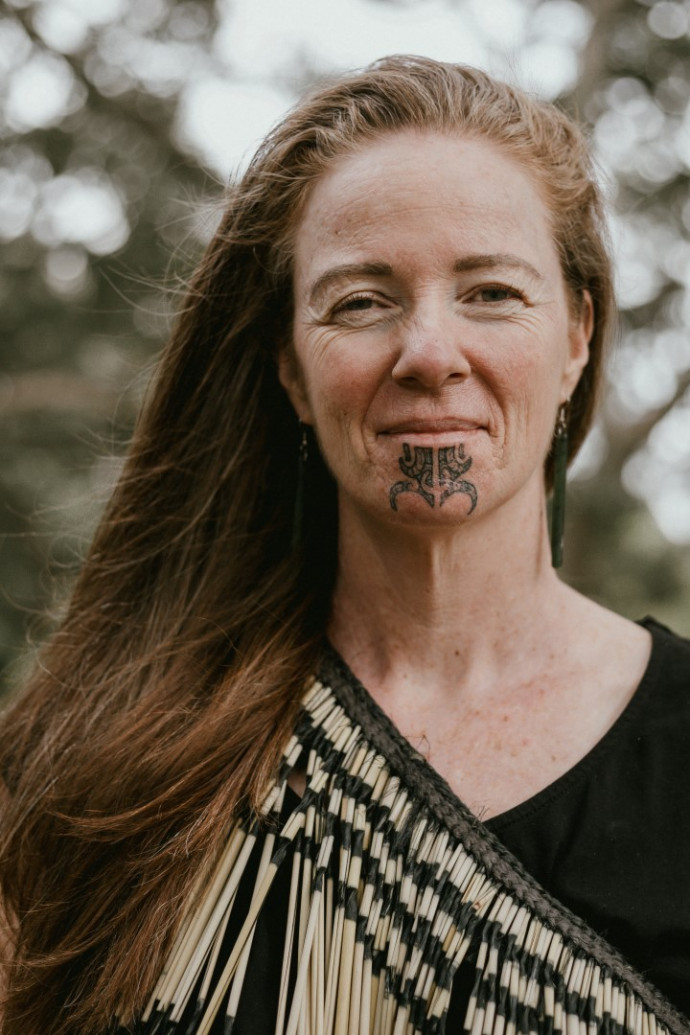2023 ECR Kōpūnui: Reclaiming, restoring, and revisioning living as wāhine Māori

Dr Hinekura Smith (Te Rarawa, Ngāpuhi, Te Ati Awa) has been awarded the Te Kōpūnui Māori Research Award for her PhD research titled ‘Whatuora: Whatu kākahu and living as Māori women’.
For this research, Hinekura worked with eight Māori women to prepare and weave kākahu, (traditionally made Māori cloaks).
During their making, her collaborators told stories of reclaiming, restoring, and revisioning ‘living as Māori’ for themselves and their whānau.
Whatuora emerged from the older practice of whatu (a weaving technique), as a theorised decolonising methodology.
Whatuora offers a way to think about the transforming changes Māori women create for themselves and their whānau, through deliberate and conscious actions to ‘live as Māori’.
Hinekura’s work gives voice to Māori women’s efforts to reclaim and revision Māori ways of being which have been disrupted by colonial assimilation. Her Whatuora methodology intertwines Mana Wāhine theory, Māori creative practice, and Māori and Indigenous knowledges.
A nomination supporter says Hinekura has made a distinctive contribution to Aotearoa’s research and practice through her “innovative scholarship at the interface of mātauranga Māori and the creative arts”.
“Dr Smith’s Whatuora research has been groundbreaking in several respects. One is that she theorises Indigenous methodologies through practice-based art rather than the ‘traditional’ Western academic written form. In so doing, Dr Smith really extends the boundaries of how we theorise and ‘do’ methodology and opens new avenues for inquiry within the wider field of Kaupapa Māori research.”
Hinekura draws from deep within Te Ao Māori, harnessing a capability only achieved through years of community practice, teaching and study.
Hinekura has held professional and academic roles at the School of Māori and Indigenous Education, and Centre for Learning and Research in Higher Education at the University of Auckland. As the Director of Nga Wai a Te Tui Māori and Indigenous Research Centre at UNITEC and a highly-regarded member of the senior research leadership team for Nga Pae o te Maramatanga Centre of Research Excellence, she takes her research expertise into national and international spaces.
In accepting the award, Hinekura says: “Tēnei au ka mihi atu ki ōku tuākana rangahau, koutou rā i para i tēnei huarahi rangahau mā mātou e whai ake nei. E ōku rangtira tēnā rā koutou. I gratefully acknowledge my tuākana rangahau (research mentors) who cleared a Kaupapa Māori research path that enables those that follow in their tapuwae (footsteps) to now add our own tapuwae to Kaupapa Māori theory.”
She says from a te reo Māori secondary school teacher, to PhD student, then academic, she never thought she would become a researcher.
“I don’t believe in the idea of an ‘accidental academic’. Instead, I think our tūpuna and tuākana put us in the places and spaces necessary for us to be in service and to create change – sometimes the reason is clear and other times it is not.”
Hinekura says she is grateful to her tūpuna and tuākana who nudged her where and when it was needed.
“I wish to thank Te Apārangi Royal Society for recognising the transforming potential of toi Māori, creative practice and Kaupapa Māori, Mana wāhine- led research, with this prestigious early career award. By elevating toi Māori from art and crafts to power pedagogical and methodological ways of being in the world, we recognise the inherent knowledge embedded and embodied within mātauranga Māori and toi practices.”
She says the final mihi is reserved for her whānau and the many wāhine who whatu alongside her: “Your stories and support are woven deeply into the fibres of every strand of my practice as a Kaupapa Māori researcher, artist, maker, and teacher. Whatuora ki a tātou!”
Te Kōpūnui Māori Research Award:
For an early career researcher with a promising trajectory who is delivering innovative Māori research.
Citation:
To Hinekura Smith for offering a way to think about the transforming changes Māori women create through deliberate and conscious actions to live ‘as Māori’.
